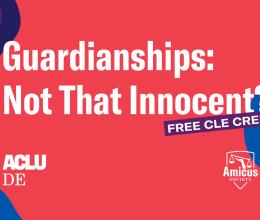PRESS RELEASE: Wednesday, October 27, 2021
CONTACT: Morgan Kelly, Communications Director, ACLU-DE, [email protected]
ACLU of Delaware’s Guardianships Panel Raises Awareness About Disability Rights in Delaware
WILMINGTON—Yesterday, the ACLU of Delaware hosted a virtual panel on guardianships to bring a local spotlight on a national issue: the use of the legal system to revoke the basic rights of people with disabilities.
Conservatorships, known as guardianships in Delaware, have been splashing headlines recently, starting to bring awareness to the countless number of Americans with disabilities whose rights have been stripped by a court-approved document that places control of their lives into the hands of someone else.
It is unknown exactly how many people are under guardianship in the United States and in Delaware, because data isn’t readily available. Panelists pointed out and repeated throughout the event that guardianships are most often the go-to mechanism for protecting the financial, mental, emotional, and physical well-being of a person with a disability—even though there are other options available that provide support without revoking a person’s rights.
An agreement among all panelists was that the general public needs more awareness and education on these other avenues.
Zoe Brennan-Krohn, staff attorney for the disability rights program at the National ACLU, said “There is an inherent harm in removing a person’s rights and liberties, and our view is that people with disabilities deserve to have the same opportunities that people without disabilities have, which is the opportunity to identify and use support.”
Supported Decision-Making is an alternative model, where people with disabilities keep their rights and their decision-making capacity. Instead of having a guardian make choices for them, people with disabilities have supporters who help them make their own choices. A person using supported decision-making appoints trusted advisors, such as friends, family, or professionals, to serve as supporters. The supporters help the person with a disability understand, make, and communicate their own choices.
Terri Hancharick, whose daughter Brigitte lives with cerebral palsy, is a Delawarean who practices supported decision-making rather than guardianships to help her daughter live an autonomous life. Prior to learning about alternative supports, Terri had placed Brigitte under guardianship at the advice of her daughter’s IEP team. Once she realized how much identity and autonomy had been stripped from Brigitte, Terri sought to end the guardianship.
“I wanted to get a bank card for Brigette, something with her name on it… I just wanted her to have some self-determination and some control over her life,” Terri said during the panel event. “So when I went to bank… they asked if I had guardianship, and I said yes, and they said ‘Well, you can’t do that.’”
Each panelist pointed out that while guardianships are over-used and need more public education, there are still instances where a guardianship may be the best avenue for a caregiver and a person with a disability.
Richard Kiger, Delaware probate attorney, drew from his professional experience with guardianship cases. “By and large the people that [seek a guardianship] understand what they’re getting into and are doing this because they care deeply about the individual [with a disability].”
Suzanne Seubert, also a Delaware probate attorney, echoed Richard’s sentiment with her own professional experience. “I do think there are instances where having a guardian is important,” Suzanne said after describing two cases she’s worked where guardianships helped to protect the person with a disability through complicated situations.
Both Suzanne and Richard have also helped to dissolve guardianships when they are no longer needed, as well as advocate for alternative support when guardianships may not be the appropriate course of action for their client’s best interests.
Panelists for this virtual event included Zoe Brennan-Krohn, ACLU’s disability rights program staff attorney, Terri Hancharick, board president, Endless Possibilities in the Community (EPIC Delaware), Brigitte Hancharick, Terri’s daughter who was formerly under a guardianship, Richard Kiger, Delaware probate attorney, Suzanne Seubert, Delaware probate attorney, and was moderated by Susan Burke, ACLU of Delaware legal director
Attorneys were able to receive continuing legal education (CLE) credit for attending the panel.
A recording of the event can be found online here: https://www.youtube.com/watch?v=qzWXha6KSyw.

